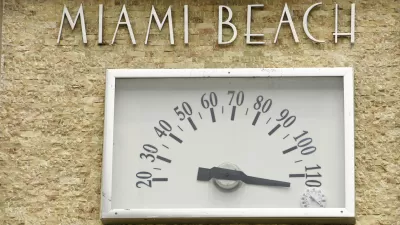Everything you've thought about climate control may be wrong. And for that realization, you've got Michael Sivak to thank.

A new study published in Environmental Research Letters has reached a counter-intuitive conclusion; the cities that require endless amounts of air conditioning to make them hospitable may be less energy intensive than the coldest locales.
As Emily Badger explains, "Michael Sivak, a research professor at the University of Michigan, compared Minnesota's largest city (and the coldest major metro in the U.S.) with Miami (our warmest metro on average), looking at the energy it takes for the two just to keep themselves at livable temperatures."
"Minneapolis – just talking here about heating and cooling – is three-and-a-half times as energy demanding as Miami, a finding that will likely shock people there (or in Milwaukee or Buffalo) who've long prided themselves on life without A/C."
"The main story is counter-intuitive to me as well because we hear all the time about how unsustainable it is to live in the desert," Sivak says. "This doesn’t actually argue that that's not the case. It just says look, there's another side of the coin as well, and we should pay attention to the other extreme."
"Sivak freely admits that he's looking here at only one small piece of the sustainability picture....But this does suggest that colder places aren't more sustainable simply by virtue of not being warm," says Badger.
FULL STORY: Cities Dependent on Air Conditioning Might Be More Sustainable Than We Think

Alabama: Trump Terminates Settlements for Black Communities Harmed By Raw Sewage
Trump deemed the landmark civil rights agreement “illegal DEI and environmental justice policy.”

Planetizen Federal Action Tracker
A weekly monitor of how Trump’s orders and actions are impacting planners and planning in America.

The 120 Year Old Tiny Home Villages That Sheltered San Francisco’s Earthquake Refugees
More than a century ago, San Francisco mobilized to house thousands of residents displaced by the 1906 earthquake. Could their strategy offer a model for the present?

Ken Jennings Launches Transit Web Series
The Jeopardy champ wants you to ride public transit.

BLM To Rescind Public Lands Rule
The change will downgrade conservation, once again putting federal land at risk for mining and other extractive uses.

Indy Neighborhood Group Builds Temporary Multi-Use Path
Community members, aided in part by funding from the city, repurposed a vehicle lane to create a protected bike and pedestrian path for the summer season.
Urban Design for Planners 1: Software Tools
This six-course series explores essential urban design concepts using open source software and equips planners with the tools they need to participate fully in the urban design process.
Planning for Universal Design
Learn the tools for implementing Universal Design in planning regulations.
Clanton & Associates, Inc.
Jessamine County Fiscal Court
Institute for Housing and Urban Development Studies (IHS)
City of Grandview
Harvard GSD Executive Education
Toledo-Lucas County Plan Commissions
Salt Lake City
NYU Wagner Graduate School of Public Service



























